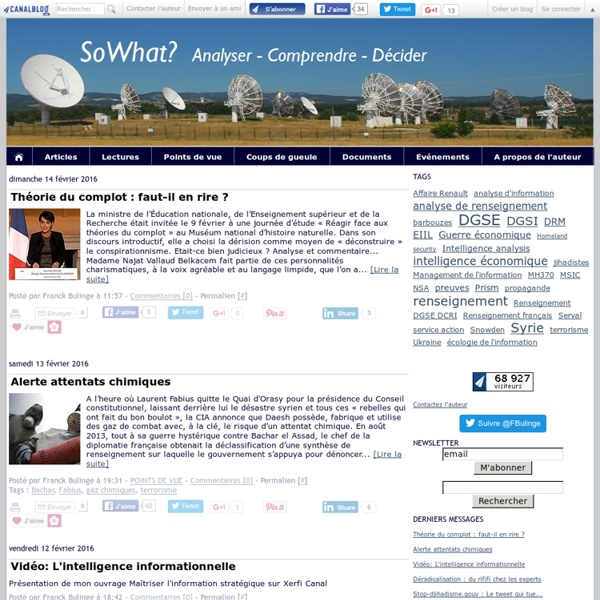



Intelligence économique - I.E. et Détective privé France NOTE : le Conseil constitutionnel a censuré les dispositions adoptée en seconde lecture par le Sénat le 8 février dernier et plus particulièrement pour l'activité de la recherche privée, les dispositions de l'article 32 de la Loi LOPPSI 2 relatives à l'Intelligence Economique. Edition-Ajout au 12 mars 2011 Note du CNSP-ARP : Ce n’est pas la définition « fourre-tout » de l’Intelligence Economique donnée par l’article 21 de la Loppsi 2 validée par le Sénat début septembre 2010, qui évitera les déviances de ces officines d’I.E. ! « Ne relèvent pas du présent titre les activités d’officier public ou ministériel, d’auxiliaire de justice et d’entreprise de presse. » A noter que cette définition, au demeurant très contestée par les ARP pour son manque de clarté et son étendue trop générale ainsi que pour sa dualité avec la définition de l’activité de la Recherche Privée, est assortie de la mention "d’exclusion" avec le Titre II de la même loi. Textes et commentaires à lire sur le blog du CNSP-ARP
Polemos.fr JIOX Preamblog J’ai commencé ce blog à l’été 2011 et je l’ai appelé : Blog de Marie Anne Chabin, Critique malicieuse et hebdomadaire de l’information numérique dans la société; à l’usage de ceux qui pensent (et donc archivent), histoire de ne pas renier mes origines. L’objectif était et reste d’exprimer ce que je pense de la société de l’information, de l’écrit comme moyen d’action, de l’impact du numérique sur le concept de mémoire – individuelle ou collective, sur la relation entre les humains et les outils qui tracent leurs actes ou supportent leurs discours. Pendant cinq ans, j’ai choisi la formule du « billet suffixé hebdomadaire » en publiant chaque lundi matin un billet titré d’un simple mot dont le suffixe était « préfixé » à l’année, ce qui m’a permis de constituer les petits recueils que voici (librement téléchargeables et réutilisables à condition de respecter le droit d’auteur) : Sérendipité et autres curiosités (2012) Allegro ma non troppo (2013) Écrits en –oire (sur fond blanc) (2014)
« L'Intelligence économique, c'est l'emploi de... - Intelligence Alain Juillet n'a aucun doute. Pour le haut responsable chargé de l'intelligence économique, cette pratique est une garantie pour les emplois de demain. Il appelle au partage de l'information pour gagner en compétitivité. Retrouvez la seconde partie de l'interview « Les conflits sont essentiellement économiques » Les 2 et 3 octobre prochains se tient l'Université d'été de l'Intelligence économique organisée par le CED sous votre parrainage. Alain Juillet, Haut responsable chargé de l'intelligence économique : Les 45 intervenants conviés à cette rencontre feront un point de la situation sur les différents domaines de l'IE et sur des ouvertures sur le futur. Vous évoquez différents domaines de l'IE ? Les techniques dédiées à l'économie, aux entreprises, s'appliquent aussi dans d'autres domaines : le social, le culturel, le sportif... Mais ces techniques ne sont-elles pas réservées aux grands-comptes ou aux entreprises qui en ont les moyens, donc difficiles d'accès pour les PMI/PME ?
Infoguerre The Crime Analyst Hotspot affordance.info La "viscosité" c'est, nous dit Wikipédia, "l'ensemble des phénomènes de résistance à l'écoulement se produisant dans la masse d'une matière, pour un écoulement uniforme et sans turbulence. Plus la viscosité augmente, et plus la capacité du fluide à s'écouler facilement diminue, plus l'énergie dissipée par l'écoulement sera importante." Bref c'est l'inverse de la fluidité. L'algorithme visqueux. Dans une interview récente au magazine Usbek & Rica, sur le sujet de la lutte contre les discours de haine ou contre les logiques de radicalisation à l'échelle des plateformes sociales et de leurs algorithmes, Gérald Bronner parle de "viscosité sociale". "On pourrait créer par les algorithmes de la viscosité sociale sur les informations douteuses, sans les retirer pour autant. En bref, que les algorithmes participent au ralentissement et à la réflexion plutôt qu'à l'accélération, à la viralité et à la dimension pulsionnelle de la rediffusion. Retour vers le futur fluide et sans friction.
Classement des meilleures formations en intelligence économique Un article de IE-Lobbying.info. Afin de compléter le premier classement des meilleurs formations au lobbying, ce classement des meilleures formations en intelligence économique a été réalisé. Il est actuellement en gestation comporte à la fois des formations publiques et privées. L’évaluation, comme pour le précédent classement des meilleures formations au lobbying, repose sur les trois critères suivants : Le rapport qualité / prix. Le Master en Stratégie d’intelligence économique de l’Ecole de guerre économique Le master cycle de l'Ecole de guerre économique a été reconnue première au classement SMBG des troisièmes cycles, en formation d’intelligence en knowledge management, mérite une mention spéciale, et notamment pour la qualité de sa formation dans le domaine de la « communication d’influence ». Le Mastère spécialisé intelligence scientifique, technique et économique de l'ESIEE (Ecole supérieure d'ingénieurs en électonique et électrotechnique) La formation se déroule sur 2 ans.
Au chômage mais en intelligence économique » C’est tout récent mais c’est une très bonne nouvelle pour tous ceux qui bossent dans l’intelligence économique puisque maintenant, lorsque vous serez au chômage, le Pôle Emploi sera à même de mettre un nom sur le métier que vous n’exercez plus ou que vous n’exercez pas encore mais que vous voulez exercer. Depuis quelques mois maintenant, la nomenclature ROME a évolué et fais apparaître plusieurs métiers de l’intelligence économique et de la veille stratégique que vous retrouverez principalement dans les fiches métiers : M1402 Conseil en organisation et management d’entreprise et M1403 Études et prospectives socio-économiques. On y retrouvera entre autre les métiers d’analyste en intelligence économique, de consultant en intelligence économique, de responsable veille stratégique, responsable Knowledge Management. Donc, maintenant, lorsque qu’un Conseiller Pôle Emploi vous demandera quel est votre job vous pourrez lui communiquer un de ces intitulés. Pour consulter les fiches :
Alephinsight Blog